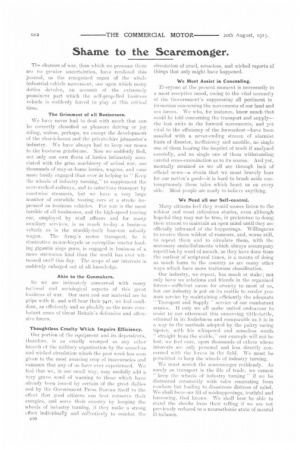Shame to the Scaremonger.
Page 4

If you've noticed an error in this article please click here to report it so we can fix it.
Th0 chances of war, than which we presume there are no greater uncertainties, have rendered this journal, as the recognized organ of the whole industrial-vehicle movement, one upon which many duties devolve, on account of the extremely prominent part which the self-propelled business vehicle is suddenly forced to play at this critical time.
The Grimmest of all Businesses.
We have never had to deal with much that can be correctly classified as pleasure driving or joy riding, unless, perhaps, we except the developmentof the char-h-bones and the private-hire jobmaster's industry. We have always had to keep our noses to the business grindstone. Now we suddenly find, not only our own fleets of lorries intimately associated with the grim machinery of aelual war, our thousands of stay-at-home lorries, wagons, and vans more busily engaged than ever in helping to J-eep the wheels of industry turning," to supplement the over-worked railways, and to substitute transport by coastwise steamers, but we have a very large number of erstwhile touring cars at a stroke impressed as business vehicles. For war is the most terrible of all businesses, and the high-speed touring car, employed, by staff officers and for many auxiliary sem ices, is as much to-day a busitie,;s vehicle as is the sturdily-built four-ton subsitly wagon. The Army's motor transport, be it diminutive motor-bicycle or caterpillar tractor hauling gigantic siege guns, is engaged in business of a more strenuous kind than the world has ever witnessed until this day. The scope of our interests is suddenly enlarged out of all knowledge.
Akin to the Gunmakers.
So we are intimately concerned with many national and sociological aspects of this great business of war. Our men and our material are to grips with it. and will bear their pirt, we feel confident, as efficiently and as pluckily as the more combatant arms of Great Britain's defensive and offensive forces.
Thoughtless Cruelty Which Impairs Efficiency.
Our portion of the equipment and its dependents, therefore, is as cruelly wronged as any other branch of the military organization by the senseh,ss and wicked circulation which the past week has seen given to the most amazing crop of inaccuracies and rumours that any of us have ever experienced. We feel that we, in our small way, may usefully add a very grave word of warning to those which have already been issued by certain of the great dailies and by the Government Press Bureau itself to the effect that good citizens can best conserve their energies, and serve their country by keeping the wheels of industry turning, if they make a strong effort individually and collectively to combat the alO circulation of cruel, senseless, and wicked reports of things that only might have happened.
We Must Assist in Concealing.
Everyone at the present moment is necessarily in a most receptive mood, owing to the vital necessity of the Government's suppressing all pertinent in formation concerning the movements of our land and sea forces. We who, for instance, know much that could be told concerning the transport and supply-the last units in the forward movements, and yet vital to the efficiency of the forwardest—have been assailed with a never-ending stream of alarmist hints of disaster, inefficiency and muddle, no single one of them bearing the imprint of truth if analysed carefully, and no single one of them withstanding careful cross-examination as to its source. And yet, mentally strained as we all are through lack of official news--a strain that we must bravely bear for our nation's good—it is hard to brush aside contemptuously these tales which beset us on every side. Most people are ready to believe anything.
We Need all our Self-control.
Many citizens feel they would sooner listen to the wildest and runiit ridiculous stories, even although hopeful they may not be true, in preference to doing their utmost to maintain an open mind until they are officially informed of the happenings. Willingness to receive these wildest of rumours, and, worse still, to repeat them and to circulate them, with the necessary embellishments which always accompany repetition by word of mouth, as they have done from the earliest of scriptural times, is a means of doing as much harm to the country as are many other ways which have more traitorous classification.
Our industry, we repeat, has much at stake; not only have we relations and friends in the organized forces—sufficient cause for anxiety to most of us, but our industry is put on its mettle to render yeoman service by maintaining efficiently the adequate " Transport and Supply " service of our combatant armies. If only we all make united endeavour to resist to our uttermost this unnerving tittle-tattle, criminal in its foolishness and comparable as it is in a way to the methods adopted by the paltry racing tipster, with his whispered and senseless words " straight from the stable," our example will not be lost, we feel sure, upon thousands-of others whose interests are only personal and less directly conveined with the forces in the field. We must be permitted to keep the wheels of industry turning.
We must scotch the scaremonger ruthlessly. As surely as transport is the life of trade, we cannot " keep the wheels of industry turning " if we be distracted eonstantly with tales emanating from nowhere but leading to disastrous distress of mind. We shall have our fill of mishappenings, truthful and harrowing, God knows. We shall best be able to stand the shocks front their telling if we are not previously reduced to a neurasthenic state of mental






































